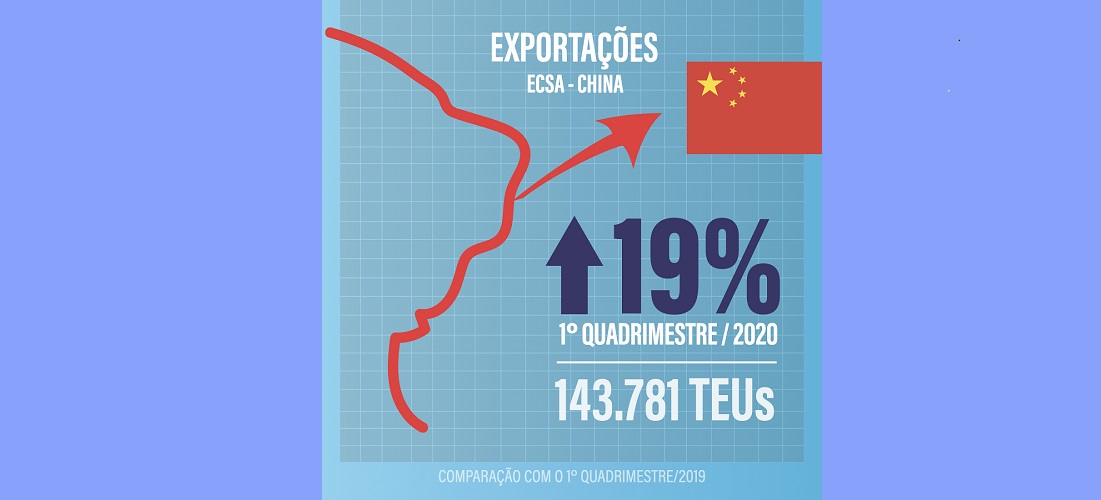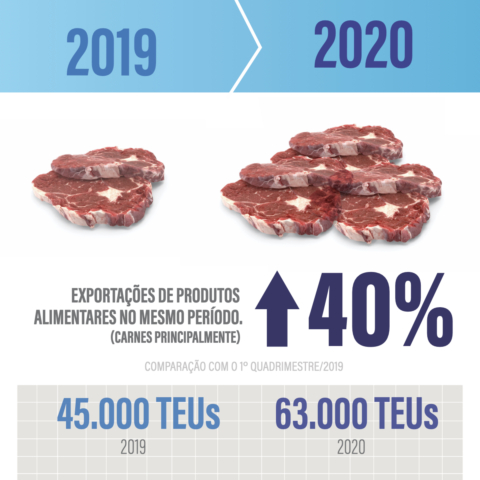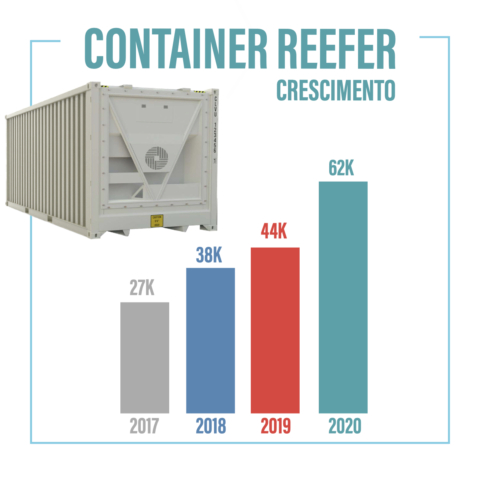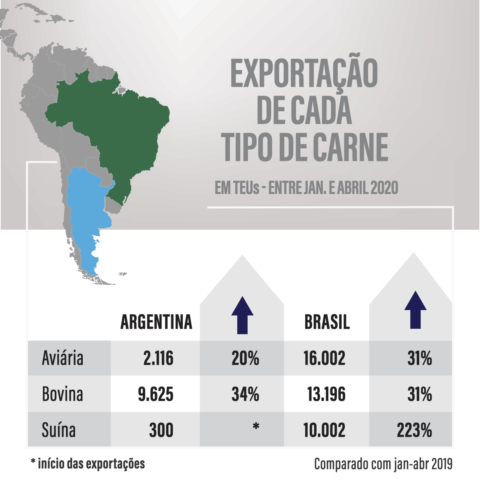
ECSA exports to China stimulate economy
Jun, 10, 2020 Posted by Sylvia SchandertWeek 202024
Exports from East Coast South American (ECSA) countries to China are on the increase. A survey conducted using data from DataLiner shows that container exports from this region, which includes Brazil, Argentina, Paraguay, and Uruguay, increased 19% in the first four months of 2020 when compared to the same period last year, totaling 143,781 TEU shipped.
The data shows the main products exported from ECSA to China during the fourth-month period was food, which came to 63,000 TEU. This is 40% more than in the first four months of 2019 when 45,000 TEU of food was exported to China. Within the food category, the biggest growth driver by far is meats.
As a result, reefer container exports correspondingly also show a 40% year-on-year rise in the first four months, with 62,000 TEU exported in the refrigerated container-type.
During January-April 2020, Brazil exported 31% more beef and 31% more poultry to China compared to the same period last year. Argentina also recorded 34% growth in beef exports and 20% in poultry during the same period.
Regarding pork, demand was exceptionally high, showing 223% year-on-year growth in Brazilian shipments over the same period comparison, and a start up in Argentine pork shipments to the Asian country. Pork is a favorite meat for the Chinese and they have been facing a disease that has decimated their pig herds – the African swine flu. To replenish inventories and supply the domestic market, the solution was to increase imports, creating this opportunity for ECSA exports.
Graphic source: DataLiner (To request a DataLiner demo click here)
Most Brazilian meats are exported via the Port of Paranaguá. Hence, in May 1,001 reefer containers were transported via Paranaguá, a volume 23% higher than that transported in May of last year. Most of the cargo transported in these containers is chicken, produced by the main agro-industrial cooperatives in Western Paraná and which go to the Port of Paranaguá for export.
American and Chinese relationships
In addition to the African swine flu, other factors also contributed to the increase in Chinese demand for Brazilian products, such as the problems for American slaughterhouses due to the coronavirus pandemic. Many American meat processors were paralyzed due to the spread of the disease among their employees, which led to the prioritization of domestic supply, reducing exports to China, which also ended up favoring ECSA countries. According to the Brazilian Refrigerators Association (Abrafrigo), in May China’s imports accounted for 56.5% of Brazilian beef exports, when considering China (39.3%) and Hong Kong (17.2%).
Another factor that should continue to benefit the ECSA region is the trade war between the United States and China. Earlier this month, sources who do not want to be identified said that China had asked its state-owned companies to suspend purchases of soybeans and pork from the United States in retaliation for the fact that US President Donald Trump says he will start a process to eliminate special treatment granted to Hong Kong, ranging from an extradition treaty to export controls. That would be a response to China’s plans to impose new security legislation on Hong Kong.
According to one of the sources, large volumes of American purchases of corn and cotton have also been suspended and China may expand the order to include other agricultural products from the United States if the US takes additional measures. Moreover, Chinese importers canceled between 10,000 and 20,000 tonnes of pork shipments from the USA – the equivalent of almost a week’s worth of orders in the past few months – after Trump’s comments, according to one of the sources.
Devaluation of the real against the dollar
Finally, it is worth noting that, in the case of Brazil, from January to May, the value of the dollar against the real grew by 30%, making Brazilian exports more competitive, also contributing to the increase in exports to China.
-
May, 06, 2020
0
Egypt given go-ahead to export citrus fruit to Brazil
-
Shipping
Apr, 30, 2024
0
ONE’s profit falls short of US$1 billion mark in FY 2023
-
Sugar and Ethanol
Oct, 07, 2024
0
Brazil hits new all-time record for sugar exports in September
-
Ports and Terminals
May, 04, 2023
0
Porto Ponta do Félix wins OEA certificate




